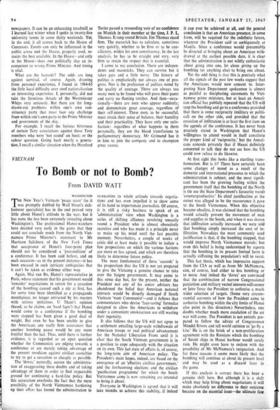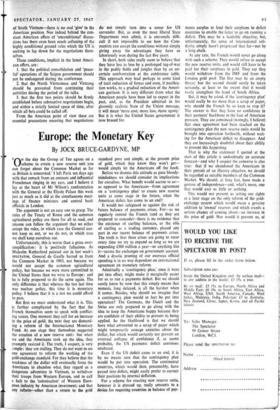To Bomb or not to Bomb?
VIETNAM
From DAVID WATT
WASHINGTON
waNew Year's Vietnam 'peace scare' (as it s promptly dubbed by Wall Street's sick- humour specialists) has in the end proved very little about Hanoi's attitude to the war; but it has none the less been extremely revealing about Washington's. The professional Hanoi-watchers here decided very early in the game that they could not conclude much from the North Viet- namese Prime Minister's statement to Mr Harrison Salisbury of the New York Times that acceptance of Hanoi's four-point plan should not be considered a 'precondition' of a conference. It has been said before, and on each occasion—as in the present instance—it has been encased in such intricate ambiguities that it can't be taken as evidence either way.
Again, Mai van Bo, Hanoi's representative in Paris, whose statement that his government would 'consider' negotiations in return for a cessation of the bombing caused such a stir at first, has for some time been identified as a propaganda mouthpiece, no longer entrusted by his masters with serious initiatives. U Thant's opinion (based, as he claims, on 'hard facts') that Hanoi would come to a conference if the bombing were stopped has been given a good deal of weight. But even he has been unable to give the Americans any really firm assurances that another bombing pause would be any more fruitful than the last. Thus, until there is further evidence, it is regarded as an open question whether the Communists are edging towards a conference or are merely taking advantage of the present revulsion against civilian casualties to try to get a cessation as cheaply as possible.
The 'doves,' naturally, accuse the administra- tion of exaggerating these doubts and of taking advantage of them in order to find respectable ground for continuing a hard-line policy. But this accusation overlooks the fact that the mere possibility of the North Vietnamese hardening up their offers has forced the administration to re-examine its whole attitude towards negotia- tions and has even impelled it to show some of its hand to importunate journalists. Of course, it is still a risky business to speak of an 'administration' view when Washington is a series of shifting alliances revolving uneasily round a President who is almost obsessively secretive and who has made it a principle never to make up his mind until the last possible moment. Nevertheless, a couple of weeks of crisis did at least make it possible to isolate a few propositions on which the various factions are more or less agreed, and which are therefore likely to determine future policy.
The most fundamental of these 'accords' is the proposition that the US is not yet prepared to give the Vietcong a genuine chance to take over the Saigon government. It may come to this some day but, for the present, neither the President nor any of his senior advisers has abandoned the belief that American national interests would be directly damaged if South Vietnam 'went Communist'—and it follows that commentators who devise 'face-saving' formulae designed to allow the Americans to withdraw under a convenient smokescreen are still wasting their ingenuity.
It also follows that the US will not agree to a settlement entailing large-scale withdrawals of American troops or real political advancement for the National Liberation Front until it is clear that the South Vietnam government is in a position to cope adequately with the situation on its own. This last state of affairs is, of course, the long-term aim of American policy. The President's main hopes, indeed, are based on the emergence of an 'effective civilian government,' and the forthcoming elections and the civilian `pacification programme' for which the South Vietnamese army is now retraining are intended to bring it about.
Everyone in Washington is agreed that it will take months to achieve this stability, if indeed it can ever be achieved at all, and the general conclusion is that an American presence, in some form, will be required for the indefinite future, whatever the President said so ambiguously at Manila. Since a conference would presumably be directed at bringing about an American with- drawal at the earliest possible date, it is clear that the administration is not wildly enthusiastic about going into one, let alone giving up the bombing (or anything else) to bring one about.
Yet the odd thing is that this is precisely what all the signals of the past few weeks suggest that the Americans would now consent to. Inter- preting State Department spokesmen is almost as painful as deciphering statements by Viet- namese prime ministers, but at least an Ameri- can official has publicly repeated that the US will stop the bombing and go to a conference provided that there is some reciprocity (military or politi- cal) on the other side, and provided that the cessation of infiltration is at least the first item on the agenda of the conference. It has never been precisely stated in Washington that Hanoi's willingness to attend would in itself constitute the proper kind of 'reciprocity,' but the Ameri- cans concede privately that if Hanoi definitely consented to talk they do not see how -the US could now refuse to do likewise.
At first sight this looks like a startling trans- formation. But is it? There have certainly been some changes of mood as a result of the domestic and international pressures to which the administration is subject; and the most signifi- cant has been the growing feeling within the government itself that the bombing of the North is (to use the State Department's favourite word) 'counterproductive.' Its chief justification at the outset was alleged to be the reassurance it gave to the South Vietnamese. When this objective became obsolete, it was claimed that the bombing would actually prevent the movement of men and supplies to the South, and when it was shown that infiltration actually increased, we were told that bombing simply increased the cost of in- filtration. Nowadays the most commonly used justification is that, if the bombing stopped, that would improve North Vietnamese morale; but even this belief is being undermined by reports that the bombing in its present limited form is actually stiffening the population's will to resist.
This last thesis, which has impressive support from the CIA as well as from Mr McNamara, can, of course, lead either to less bombing or to more. And indeed the 'doves' are convinced that the combination of narrow Congressional patriotism and military vested interests will sooner or later force the President to authorise a much wider selection of targets. (Some very circum- stantial accounts of how the President came to authorise bombing within the city limits of Hanoi also point in this direction.) Nevertheless, one doubts whether much more escalation of the air war will come. The President is not entirely pre- pared to follow the advice of Congressman Mendel Rivers and tell world opinion to `go fly a kite.' He is on the brink of a non-proliferation agreement with the Russians which the bombing of Soviet ships in Hanoi harbour would surely ruin. He night even have to reckon with the possibility of Mr McNamara's resignation. And for these reasons it seems more likely that the bombing will continue at about its present level and may be used as a discard later in the game.
If this analysis is correct there has been a genuine shift here. But although it is a shift which may help bring about negotiations it will make absolutely no difference to their outcome becanse on the essential issue—the ultimate fate of South Vietnam—there is no real 'give' in the American position. Nor indeed behind the con- stant American offers of 'unconditional' discus- sions has there even been much softening of the highly conditional ground rules which the US is seeking to lay down for the negotiations them- selves.
These conditions, implicit in the latest Ameri- can offers, are: 1. that the political consolidation and 'peace- ful' operations of the Saigon government should not be endangered during the conference.
2. that the North Vietnamese and Vietcong should be prevented from continuing their activities during the period of the talks.
3. that the first two points should be firmly established before substantive negotiations begin, and within a strictly limited space of time, after which all bets could be called off.
From the American point of view these are essential precautions ensuring that negotiations do not simply turn into a cover for US surrender. But, as even the most liberal State Department men admit, it is extremely diffi- cult if not impossible to see how the Com- munists can accept the conditions without simply giving away the advantages they have so laboriously won during the last five years.
In short, both sides really seem to believe that they have less to lose by a prolonged tug-of-war in the paddy fields and jungles than by an un- certain confrontation at the conference table. This approach may lead perhaps to some kind of tacit reduction of forces and even, if pacifica- tion works, to a gradual reduction of the Ameri- can garrison. It is very different from what the American people have been led to expect in the past, and, as the President admitted in his gloomily realistic State of the Union message, it will mean 'more cost, more loss, more agony.' But it is what the United States government is now braced for.



































 Previous page
Previous page